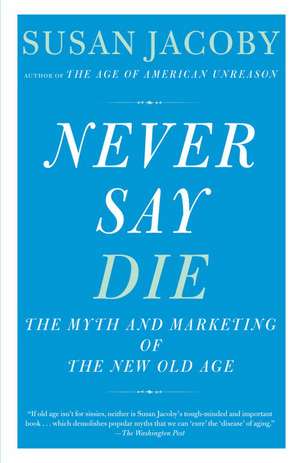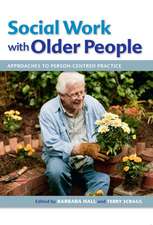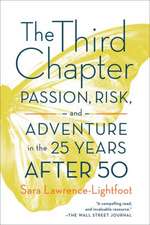Never Say Die: The Myth and Marketing of the New Old Age
Autor Susan Jacobyen Limba Engleză Paperback – 31 ian 2012
Combining historical, social, and economic analysis with personal experiences of love and loss, Jacoby unmasks the fallacies promoted by twenty-first-century hucksters of longevity, and reveals the hazards of the magical thinking that prevents us from facing the genuine battles of growing old. Never Say Die speaks to Americans, whatever their age, who draw courage and hope from facing reality instead of embracing platitudes and delusions, and who want to grow old with dignity and purpose. It is a life-affirming and powerful message that has never been more relevant.
Preț: 105.86 lei
Nou
Puncte Express: 159
Preț estimativ în valută:
20.27€ • 20.84$ • 16.81£
20.27€ • 20.84$ • 16.81£
Carte disponibilă
Livrare economică 27 ianuarie-10 februarie
Preluare comenzi: 021 569.72.76
Specificații
ISBN-13: 9780307456281
ISBN-10: 0307456285
Pagini: 332
Dimensiuni: 132 x 201 x 19 mm
Greutate: 0.25 kg
Editura: VINTAGE BOOKS
ISBN-10: 0307456285
Pagini: 332
Dimensiuni: 132 x 201 x 19 mm
Greutate: 0.25 kg
Editura: VINTAGE BOOKS
Notă biografică
Susan Jacoby is the author of nine books, most recently The Age of American Unreason, Alger Hiss and the Battle for History, and Freethinkers: A History of American Secularism. She writes The Spirited Atheist blog for On Faith, a website sponsored by The Washington Post. She lives in New York City. For more information, visit www.susanjacoby.com.
Extras
Preface
Anyone who has not been buried in a vault for the past two decades is surely aware of the media blitz touting the “new old age” as a phenomenon that enables people in their sixties, seventies, eighties, nineties, and beyond to enjoy the kind of rich, full, healthy, adventurous, sexy, financially secure lives that their ancestors could never have imagined. Much of this propaganda is aimed at baby boomers now in their late forties, fifties, and early sixties, because marketers are betting that the boomer generation will spend almost anything on products that say “Hell no, we won’t go!” to a traditionally defined old age. I too have read (and occasionally written) optimistic screeds on the joys and advantages of the new old age, also known as “young old age,” also known as “successful aging.” But I now regard the relentlessly positive vision promulgated by cheerleaders for the extension of longevity as more of an exhortation, even an ultimatum, than an evidence-based portrait of old age as it is today and is likely to remain for the huge baby boom generation. As the oldest boomers turn sixty-five, it is past time for a more critical and skeptical look at old age as it really is in America today, especially for the “old old”—those in their ninth and tenth decades of life. When I told a forty-something colleague that I was writing a book about the myth of young old age, she asked how old I was (a question still considered impolite in most contexts). I told her I was sixty-three. “Surely you don’t think of that as old?” she asked in a horrifi ed tone. Actually, being an American who came of age in the “forever young” decade, I do not usually think of myself as old. But when I recall how quickly the last two decades, packed with love and work, have sped by, I know how close eighty, or ninety, really is—as distinct from whatever subjective notions I cherish about my own youthfulness. Old, in America, always seems to be a decade or preferably two decades older than one’s own age. The difference between forty and sixty is that, at sixty, the imaginative leap to old old age is not only possible but inescapable.
The idea that there is a new kind of old age, experienced in a radically different way from old age throughout history, is integral to the marketing of longevity. For who would want to live to be one hundred if, as individuals and as a society, we accepted or even suspected that the new old age, after a certain point, encompasses most of the vicissitudes of old-fashioned old age? There is a considerable amount of truth in the assertion that many old people today—if they are in sound fi nancial shape, if they are in reasonably good health, and if they possess functioning brains—can explore an array of possibilities that did not exist even a generation ago. “If ” is the most important word in the preceding sentence. The idea that we can control the future by aggressively focusing on and taking care of ourselves is an article of faith for baby boomers. Yet in many instances, successful aging—or the outward appearance of successful aging—means only that a person has managed to put on a happy face for the rest of the world; present an image of vigor and physical well-being even when bones are aching; smile even though a heart may be breaking with loss; do everything possible to conceal memory lapses; demonstrate a consistent willingness to try anything new; and scoff (with just the right, light touch of humor) at those misguided contemporaries who refuse to “live in the present.”
Here’s what one cannot do and be considered a person who is aging successfully: complain about health problems to anyone younger; weep openly for a friend or lover who has been dead more than a month or two; admit to depression or loneliness; express nostalgia for the past (either personal or historical); or voice any fear of future dependency— whether because of poor physical health, poor finances, or the worst scourge of advanced old age, Alzheimer’s disease. American society also looks with suspicion on old people who demand to be left alone to deal with aging in their own way: one must look neither too needy for companionship nor too content with solitude to be considered a role model for healthy aging rather than a discontented geezer or crone. Successful aging awards are conferred only on those who have managed (often as much by biological good luck as effort) to avoid, or convince others that they have avoided, the arduous uphill fight that eventually consumes all who live too long to retain control over either the mundane or the important decisions of everyday life. It’s great to be old—as long as one does not manifest too many of the typical problems of advanced age. The reality evaded by propagandists for the new old age is that we all are capable of aging successfully—until we aren’t.
I hope that this book about the genuine battles of growing old will provide support for all who draw their strength and courage from reality, however daunting that reality may be, rather than from platitudes about “defying old age.” This commonly used phrase in the annals of the so-called new old age fills me with rage, because the proximity of old age to death is not only undefiable but undeniable. Anger, by the way, is another emotion considered inappropriate in the old; the dubious notion of the “wisdom of old age” rests on the belief that elders can, and should, transcend the passions, vaulting ambition, and competitiveness of their younger adult lives and arrive at some sort of peace that passeth all understanding.
The capacity to negotiate between the past and the present, not transcendence of the emotions and desires that have made us who we are, is the proper definition of aging with dignity. The great Russian-born dancer Mikhail Baryshnikov, who once seemed to fl oat above stage and earth as the preeminent male classical ballet star of his generation, bravely called himself a “dancing fossil” on the Today show. Having just turned sixty, he described the role of the older dancer as that of “a mediator between your memories and your [current] abilities as a human skeleton.” This unromantic description of successful aging is applicable not only to nature’s blessed exceptions, who figure so prominently in most prescriptions for age-defying behavior, but to anyone whose intense desire for meaningful experience remains undiminished by a realistic recognition of time’s indelible, deepening imprint. The search for new, earthbound ways to express lifelong passions—not to transcend them in some mythical metamorphosis that seems more akin to a heavenly ascension—demands the most arduous efforts from and offers the most rich rewards for every aging human skeleton. Anyone who has outlived his or her passions has lived too long. Wordsworth got it exactly right, at the tender age of thirty-seven, in his “Ode: Intimations of Immortality from Recollections of Early Childhood”: O joy! That in our embers / Is something that doth live, / That nature yet remembers / What was so fugitive!
From the Hardcover edition.
Anyone who has not been buried in a vault for the past two decades is surely aware of the media blitz touting the “new old age” as a phenomenon that enables people in their sixties, seventies, eighties, nineties, and beyond to enjoy the kind of rich, full, healthy, adventurous, sexy, financially secure lives that their ancestors could never have imagined. Much of this propaganda is aimed at baby boomers now in their late forties, fifties, and early sixties, because marketers are betting that the boomer generation will spend almost anything on products that say “Hell no, we won’t go!” to a traditionally defined old age. I too have read (and occasionally written) optimistic screeds on the joys and advantages of the new old age, also known as “young old age,” also known as “successful aging.” But I now regard the relentlessly positive vision promulgated by cheerleaders for the extension of longevity as more of an exhortation, even an ultimatum, than an evidence-based portrait of old age as it is today and is likely to remain for the huge baby boom generation. As the oldest boomers turn sixty-five, it is past time for a more critical and skeptical look at old age as it really is in America today, especially for the “old old”—those in their ninth and tenth decades of life. When I told a forty-something colleague that I was writing a book about the myth of young old age, she asked how old I was (a question still considered impolite in most contexts). I told her I was sixty-three. “Surely you don’t think of that as old?” she asked in a horrifi ed tone. Actually, being an American who came of age in the “forever young” decade, I do not usually think of myself as old. But when I recall how quickly the last two decades, packed with love and work, have sped by, I know how close eighty, or ninety, really is—as distinct from whatever subjective notions I cherish about my own youthfulness. Old, in America, always seems to be a decade or preferably two decades older than one’s own age. The difference between forty and sixty is that, at sixty, the imaginative leap to old old age is not only possible but inescapable.
The idea that there is a new kind of old age, experienced in a radically different way from old age throughout history, is integral to the marketing of longevity. For who would want to live to be one hundred if, as individuals and as a society, we accepted or even suspected that the new old age, after a certain point, encompasses most of the vicissitudes of old-fashioned old age? There is a considerable amount of truth in the assertion that many old people today—if they are in sound fi nancial shape, if they are in reasonably good health, and if they possess functioning brains—can explore an array of possibilities that did not exist even a generation ago. “If ” is the most important word in the preceding sentence. The idea that we can control the future by aggressively focusing on and taking care of ourselves is an article of faith for baby boomers. Yet in many instances, successful aging—or the outward appearance of successful aging—means only that a person has managed to put on a happy face for the rest of the world; present an image of vigor and physical well-being even when bones are aching; smile even though a heart may be breaking with loss; do everything possible to conceal memory lapses; demonstrate a consistent willingness to try anything new; and scoff (with just the right, light touch of humor) at those misguided contemporaries who refuse to “live in the present.”
Here’s what one cannot do and be considered a person who is aging successfully: complain about health problems to anyone younger; weep openly for a friend or lover who has been dead more than a month or two; admit to depression or loneliness; express nostalgia for the past (either personal or historical); or voice any fear of future dependency— whether because of poor physical health, poor finances, or the worst scourge of advanced old age, Alzheimer’s disease. American society also looks with suspicion on old people who demand to be left alone to deal with aging in their own way: one must look neither too needy for companionship nor too content with solitude to be considered a role model for healthy aging rather than a discontented geezer or crone. Successful aging awards are conferred only on those who have managed (often as much by biological good luck as effort) to avoid, or convince others that they have avoided, the arduous uphill fight that eventually consumes all who live too long to retain control over either the mundane or the important decisions of everyday life. It’s great to be old—as long as one does not manifest too many of the typical problems of advanced age. The reality evaded by propagandists for the new old age is that we all are capable of aging successfully—until we aren’t.
I hope that this book about the genuine battles of growing old will provide support for all who draw their strength and courage from reality, however daunting that reality may be, rather than from platitudes about “defying old age.” This commonly used phrase in the annals of the so-called new old age fills me with rage, because the proximity of old age to death is not only undefiable but undeniable. Anger, by the way, is another emotion considered inappropriate in the old; the dubious notion of the “wisdom of old age” rests on the belief that elders can, and should, transcend the passions, vaulting ambition, and competitiveness of their younger adult lives and arrive at some sort of peace that passeth all understanding.
The capacity to negotiate between the past and the present, not transcendence of the emotions and desires that have made us who we are, is the proper definition of aging with dignity. The great Russian-born dancer Mikhail Baryshnikov, who once seemed to fl oat above stage and earth as the preeminent male classical ballet star of his generation, bravely called himself a “dancing fossil” on the Today show. Having just turned sixty, he described the role of the older dancer as that of “a mediator between your memories and your [current] abilities as a human skeleton.” This unromantic description of successful aging is applicable not only to nature’s blessed exceptions, who figure so prominently in most prescriptions for age-defying behavior, but to anyone whose intense desire for meaningful experience remains undiminished by a realistic recognition of time’s indelible, deepening imprint. The search for new, earthbound ways to express lifelong passions—not to transcend them in some mythical metamorphosis that seems more akin to a heavenly ascension—demands the most arduous efforts from and offers the most rich rewards for every aging human skeleton. Anyone who has outlived his or her passions has lived too long. Wordsworth got it exactly right, at the tender age of thirty-seven, in his “Ode: Intimations of Immortality from Recollections of Early Childhood”: O joy! That in our embers / Is something that doth live, / That nature yet remembers / What was so fugitive!
From the Hardcover edition.
Recenzii
“If old age isn’t for sissies, neither is Susan Jacoby’s tough-minded and important book. . . which demolishes popular myths that we can ‘cure’ the ‘disease’ of aging.” —The Washington Post
“For those of us who are old, Susan Jacoby's candor about old age is bracing; for those not yet old, Never Say Die should provide an unsentimental education for the years to come.” –Philip Roth
“Jacoby’s tough-minded refusal to buy the rosy image painted by advertisers and the ‘anti-aging industry’—a greedy crowd that includes bogus health gurus, pill pushers and other medical hucksters—is empowering.” —Time
“Jacoby is sharp and shoots straight.” —The New Yorker
“[A] book that will change the way you think about growing old. . . . In the end, and in ways not recognized at the beginning of the book, Never Say Die is life-affirming.” —Washington Independent Review of Books
“Mixes rigorous reportage and tart-tongued criticism with memoir and history, slashing through romanticized versions of the golden years and delivering tough truths.” —Newsday
“Jacoby cuts through the fog of bromides and half-truths enveloping the discussion of aging, shines a light on issues long neglected and offers cogent solutions to pressing problems.” —The Miami Herald
“In this beautifully crafted book, [Jacoby] punctures the promises that aging will eventually be 'cured' either by a wonder drug or though positive thinking. The good news is that if we wake up from our delusions we may be better able to grow old with dignity.” –Barbara Ehrenreich, author of Nickel and Dimed: On (Not) Getting by in America
“Jacoby’s book, which mixes the intellectual and the emotional, academic studies and personal anecdotes, is intentionally contentious. . .That is just as it should be. Jacoby does not want to serve as a destroyer of hope. Thank goodness, however, that she is willing to be perceived as a destroyer of false hope.” —Seattle Times
“Lively, carefully researched. . . . [Jacoby] writes with both passion and reason.” —St. Petersburg Times
“Eloquent. . . . [Jacoby] is courageously right. . . . One can hope that her impassioned, closely argued tract gains a serious hearing among her fellow boomers.” —Columbia Journalism Review
“Never Say Die is a beautifully written, clear-eyed, and deeply compassionate book." —Sam Harris, author of The Moral Landscape and The End of Faith.
“For those of us who are old, Susan Jacoby's candor about old age is bracing; for those not yet old, Never Say Die should provide an unsentimental education for the years to come.” –Philip Roth
“Jacoby’s tough-minded refusal to buy the rosy image painted by advertisers and the ‘anti-aging industry’—a greedy crowd that includes bogus health gurus, pill pushers and other medical hucksters—is empowering.” —Time
“Jacoby is sharp and shoots straight.” —The New Yorker
“[A] book that will change the way you think about growing old. . . . In the end, and in ways not recognized at the beginning of the book, Never Say Die is life-affirming.” —Washington Independent Review of Books
“Mixes rigorous reportage and tart-tongued criticism with memoir and history, slashing through romanticized versions of the golden years and delivering tough truths.” —Newsday
“Jacoby cuts through the fog of bromides and half-truths enveloping the discussion of aging, shines a light on issues long neglected and offers cogent solutions to pressing problems.” —The Miami Herald
“In this beautifully crafted book, [Jacoby] punctures the promises that aging will eventually be 'cured' either by a wonder drug or though positive thinking. The good news is that if we wake up from our delusions we may be better able to grow old with dignity.” –Barbara Ehrenreich, author of Nickel and Dimed: On (Not) Getting by in America
“Jacoby’s book, which mixes the intellectual and the emotional, academic studies and personal anecdotes, is intentionally contentious. . .That is just as it should be. Jacoby does not want to serve as a destroyer of hope. Thank goodness, however, that she is willing to be perceived as a destroyer of false hope.” —Seattle Times
“Lively, carefully researched. . . . [Jacoby] writes with both passion and reason.” —St. Petersburg Times
“Eloquent. . . . [Jacoby] is courageously right. . . . One can hope that her impassioned, closely argued tract gains a serious hearing among her fellow boomers.” —Columbia Journalism Review
“Never Say Die is a beautifully written, clear-eyed, and deeply compassionate book." —Sam Harris, author of The Moral Landscape and The End of Faith.
Descriere
In a narrative that combines the intensely personal with social, economic, and historical analysis, Jacoby turns an unsparing eye on the marketers of longevity--pharmaceutical companies, lifestyle gurus, and scientific businessmen who suggest that there will soon be a "cure" for the "disease" of aging.














